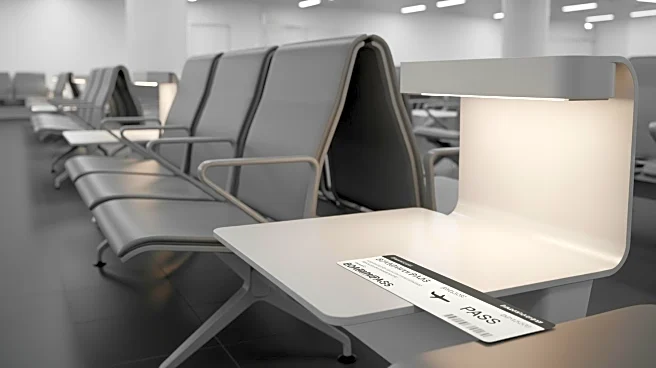What's Happening?
Southwest Airlines is implementing significant changes to its boarding process and seating arrangements starting January 27, 2026. The airline will transition from its traditional open seating policy to assigned seating, a move that marks a departure
from its long-standing practice. Passengers will receive boarding passes with a group number from 1 to 8, unless they opt for priority boarding. The new boarding method, known as the WILMA method, will prioritize passengers in window seats, followed by those in middle and aisle seats, starting from the back of the plane. This change aims to streamline the boarding process and improve efficiency. Additionally, Southwest will offer a last-minute Priority Boarding option with dynamic pricing, allowing passengers to join the priority boarding group for an additional fee.
Why It's Important?
The introduction of assigned seating and a new boarding process by Southwest Airlines is a significant shift in its operational strategy, potentially impacting passenger experience and satisfaction. By adopting the WILMA method, Southwest aims to enhance boarding efficiency, which could lead to reduced boarding times and improved flight punctuality. This change may also affect passengers' ability to secure overhead bin space, particularly for those seated towards the front of the plane who are not in priority boarding groups. The dynamic pricing for priority boarding could generate additional revenue for the airline, while offering passengers more flexibility. These changes reflect Southwest's response to evolving customer expectations and competitive pressures within the airline industry.
What's Next?
As Southwest Airlines prepares to implement these changes, passengers and industry stakeholders will be closely monitoring the impact on customer satisfaction and operational efficiency. The airline may need to address potential challenges related to passenger adjustment to the new system, particularly for those accustomed to the open seating policy. Feedback from passengers will likely influence any further adjustments or refinements to the boarding process. Additionally, other airlines may observe Southwest's approach and consider similar strategies to enhance their own boarding procedures. The success of Southwest's new boarding method could set a precedent for future innovations in airline operations.
Beyond the Headlines
The shift to assigned seating and a structured boarding process by Southwest Airlines may have broader implications for the airline industry. It highlights a trend towards increased personalization and efficiency in air travel, as carriers seek to balance operational needs with customer preferences. This move could also influence competitive dynamics, as airlines strive to differentiate themselves through service enhancements. Furthermore, the introduction of dynamic pricing for priority boarding raises questions about equity and accessibility, as passengers with financial means may have an advantage in securing preferred boarding positions.
















